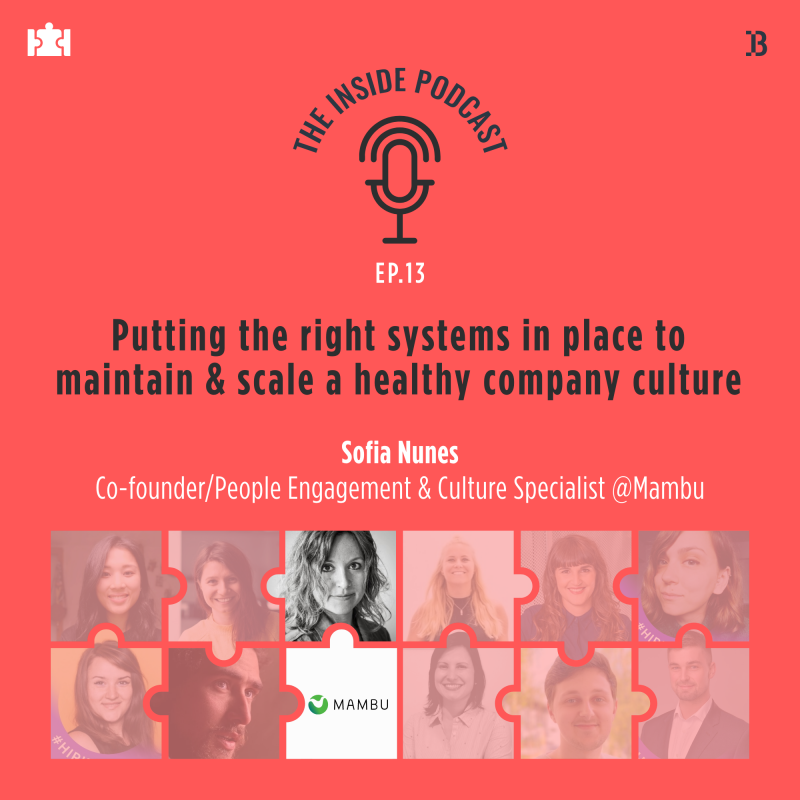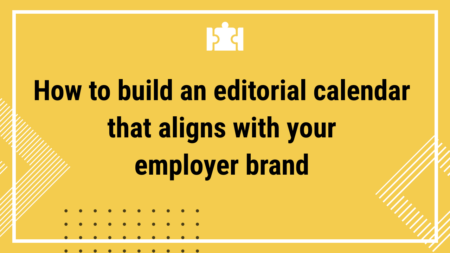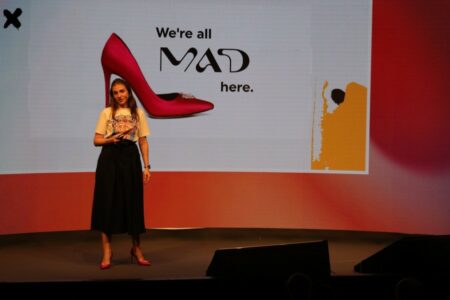Overview
Ep. 13 of Employer Branding: The Inside Podcast is out! In this episode, we’ve had the opportunity to interview Sofia Nunes, People Engagement & Culture Specialist at Mambu. With a background in psychology & a Masters in human-computer interaction, Sofia has talked to us about the importance of putting the right systems in place to maintain and scale a healthy company culture.
What you’ll learn by listening
- Company culture insights – tips on maintaining & scaling a healthy culture
- Preserving values via people initiatives that bring out the best in people
- The importance of autonomy, mastery, and purpose for continuous employee engagement
- How perks, regardless of their nature, don’t equal engagement
About the company
Mambu gives financial institutions a powerful competitive edge by allowing them to rapidly create, launch and service any lending or deposit portfolio through a modern SaaS banking platform. Built from the cloud up, Mambu is a powerful alternative to the costs and complexity of traditional core banking systems or custom in-house solutions.
Enjoy listening to Ep. 12 of Employer Branding: The Inside Podcast on Spotify!
Podcast transcription
Georgiana: Hi everyone! This is Georgiana and you’re listening to Employer Branding: The Inside Podcast where people from mid and small companies talk about what it’s like to be an employer branding manager, a talent acquisition manager, cultural manager, and they give their insights into how they do their daily job. Today I’m talking to Sofia Nunes, People Engagement & Culture Specialist at Mambu. Hi, Sofia! Thank you so much for accepting my invitation.
Sofia Nunes: Thank you for inviting me.
Georgiana: I first have to say that Mambu is a company that is very, very dear to me. We’ve been working with Mambu for some time now and I have come to appreciate the culture that your company has. So Sofia, you currently work as people engagement and culture specialist for Mambu. Please tell us what do you do on a daily basis?
Sofia Nunes: Sure. If you look at the entire employee journey, and the different touch points from the hiring process to offboarding, from an engagement perspective I am mostly involved in designing and implementing initiatives and projects that add value and make that employee experience more memorable for all Mambuvians. That’s how we call our employees. From a culture perspective, obviously, it’s a broader site. It’s all about ensuring that we have the right systems in place to maintain and to scale the culture that we’ve been fortunate to create.
Georgiana: And before you had this role, you were head of talent and culture. Why the role change and which one would you say is more challenging?
Sofia Nunes: That’s an interesting question. As a founder – especially in my case, not being the technical founder since my background is in clinical psychology – I would say that the first years of this journey were not so much about building a consistent career path. But instead, it was more about being a jack of all trades if you wish; and filling the gaps in the business. That’s all done until we are able to hire someone with deeper expertise in those areas.
In my case, that meant doing a bit of everything; from support, sales, implementation projects with customers, and finally, I started narrowing things down, being able to set more people-oriented goals. The head of talent and culture was the first one of those roles. It was a good fit for our company size back then and the team structure that we had at that point. But as we continued growing and restructuring the people team, that role became obsolete. That also matched the point when I went on maternity leave for one year. When I came back, I was able to start focusing on the areas that I really love and appreciate the most, which is again scaling our company’s culture.
Perks, engagement, and culture are not completely related or related at all. It’s a nice thing to have. But it goes way deeper than that. As Daniel Pink mentioned, it’s about autonomy, mastery, and purpose. People need to feel they have enough autonomy to essentially manage their day, their workload, their work overall.
Sofia Nunes @MAMBU
Georgiana: Would you say this is your favorite part about your job?
Sofia Nunes: Yes, absolutely. My favorite part of my daily work, if I would have to think about it, is really more than coming up with those ideas but also seeing the results and seeing the impact it creates on people when I talk to them. I have a lot of one-on-ones with people from all departments and all functions in Mambu, and seeing the impact and seeing how this translates into their daily work is the best part of it, for sure.
Georgiana: Mambu is the composable banking company, so to say. So maybe you can tell us a little bit about the platform you’re developing, and how you came up with the idea to found such a company.
Sofia Nunes: Indeed. So Mambu is a core banking platform. We have customers a little bit all over the world, ranging from financial institutions to any organization providing financial services. It started from an idea that came to us really. It was during a Master’s Program in Human Computer Interaction, where I met my future co-founders. It was a joint program between Carnegie Mellon University in Pittsburgh and Madeira University in Portugal.
Our capstone project was sponsored back then by a Portuguese banking software company. And they were looking at innovative ideas to support their customers. Their customers were also banks, microfinance institutions in different countries with official Portuguese language. They sent us on a mission to Mozambique to do that research. There were a lot of research interviews.
We spent a total of six weeks in Mozambique interviewing banks, microfinance institutions, executives, employees, and their customers, their actual clients in rural areas. What we saw and what we realized from that research was that more than this innovative and mobile solution that our sponsor wanted, they needed a solution that would help them support the needs of these clients; these are very flexible needs because these are people who need very small loans, which are, by nature, just excluded from the traditional financial system.
We came back with this idea and we proposed it. Back then our sponsor could not pursue the project because they were, in the meantime, just restructured and acquired by another company. We still thought it was a great idea. And in 2010, beginning of 2010, Eugene and Freddy started building the product. At that point, there was nothing. I joined them eight months later after having another project in Helsinki, in Finland. I joined them when there was already something built; a product to sell and support. That’s how it all came up.
Georgiana: It really has developed tremendously over the years. And I know, I have known Mambu for, I think, four years now. So congratulations on the wonderful work, guys. Sofia, tell me what is the hardest thing you’ve had to do in your career so far.
Sofia Nunes: I think we would have to go to a pre Mambu time. It was, on one hand the hardest, but on the other hand, the best thing I’ve done. I was, back then, working with a background in clinical psychology, in Portugal in 2006-2007 when it was not so easy to find a consistent job essentially. I was doing a bunch of things all over from tutoring to working as a consultant for different companies assessing the psychometric test assessments for employees. And I was not completely fulfilled at that point.
My decision was to – once I found out about this program, about the master’s program – decide. Okay, do I continue as I am? Or do I go a step back, which seemed to be a step back then because it involved studying again for another year and a half, almost two years, and put this path on hold and see what comes up next. So that was my decision, I actually did that and got a scholarship. I was able to go back to study those two years. It was really the best decision. That’s when, again, I met my future co-founders and where Mambu was started.
Georgiana: So yes, I suppose we need to listen to our instincts whenever in doubt. Okay, do you have a project with Mambu in mind that you feel particularly attached to?
Sofia Nunes: Currently, we have a project that we call Cultural Ambassadors. It is a yearly initiative that started last year actually. So we ask all Mambuvians to elect people that they feel embrace our values at the company. And these people will then be our cultural ambassadors, just in the sense of propagating the values and the core behaviors and attitudes that we want in Mambu. They are involved in different types of initiatives. We are working with them on different projects, local initiatives because they are elected in different regions that we have a presence in an office. They essentially bring out the best in people in those offices and it’s just a constant reminder of how our culture is and how we want to replicate it.
Georgiana: Nice. That’s a very nice one. A company culture or people management myth that you could debunk? I’m curious…
Sofia Nunes: I would say there are a few. But if I would have to choose one, it would be that perks equal engagement. It couldn’t be further from the truth. Perks, engagement, and culture are not completely related or related at all. It’s a nice thing to have. But it goes way deeper than that. I will always go back to the three pillars that Daniel Pink once mentioned. It’s about autonomy, mastery, and purpose. People need to feel they have enough autonomy to essentially manage their day, their workload, their work overall, even more so during this pandemic. We’ve been seeing that, right?
People lost control in so many other aspects of their lives that this is crucial for them; just giving them additional flexibility so that they can get back this autonomy. Mastery is about continuous growth, right? Feeling that you are growing in your role, as a person; that you’re developing essentially. And finally, purpose is about feeling that you’re working towards something that’s bigger than yourself; something that you believe in and that you really want to be part of. I think it’s really these key areas. The perks and benefits, of course, they’re nice to have. But, truth be told, nobody decides to switch jobs or roles or companies because that company offers better perks, right?
Georgiana: That’s true. Sofia, can you recommend a book that was influential to you?
Sofia Nunes: I have many. I can give you one, but I can also give you three.
Georgiana: Go ahead.
Sofia Nunes: The first one is a fiction book that I have read many, many, many years ago. It’s a very short book, and not many people know about it. But it’s been really influential to me. It’s called Jonathan Livingston Seagull (Richard Bach). It’s about a seagull. So there are really no humans in this story. And it’s all about the metaphor, of course, and the symbolism behind it. It’s about challenging the status quo, essentially; a seagull that will challenge what other seagulls do and think they should be doing as their way of living.
Georgiana: A metaphor, then.
Sofia Nunes: Yes, that’s a very interesting one; a very easy read, too. As for nonfiction, I would choose another very small one, but also really interesting. It’s called The War of Art (Steven Pressfield). And it’s about creative work and resistance; how to conquer resistance and do your best work. And it’s, again, a really easy read, very short snippets and thoughts but to the point. I think this is really, really interesting, too. It’s not just on the creative work for artists. I think it applies to anyone doing any type of work. And finally if we look at a more culture related book, I would say Powerful by Patty McCord, former chief talent executive at Netflix.
While I don’t agree with many of the initiatives as I don’t think they are applicable to many companies, I would say that the underlying message, which is to challenge the status quo and to use first principles thinking, which she does a lot, is key for people handling the most complex system we have in the world, which is the human being, right? And that’s the underlying message that I love the most about that book.
Georgiana: Super. Okay, Sofia. And this brings me to my last question. I’m really curious to know if there is any secret sauce for building the wonderful and beautiful and warm culture that you helped to build at Mambu? How are you guys going to maintain this as you grow? Because you’re constantly growing, right?
Sofia Nunes: Right, right, we are. I’m not sure if it’s a secret sauce. But we have always been very clear about the core values, the attitudes, and those behaviors that we want to have. And that has been a core part of the entire lifecycle of employees – from hiring to offboarding. But like you said, as we continue growing, this is going to obviously become more challenging. And so we want to do this at scale, of course.
We’re creating or trying to create systems that will support that same framework, and build accountability also, and to make sure that everyone is enabled, essentially to flag any issues, to let us know when things are not working as we propose them, as we want in Mambu. That’s what we have in mind currently.
Georgiana: I wish you the best of luck in your role and in growing Mambu to the size that you guys have in mind. And I thank you so much, Sofia. I hope to meet you in person sometime.
Sofia Nunes: Thank you! I wish you the same, Georgiana. Best of luck!
For more podcasts and content on employer branding-related things, check us out on employerbranding.tech. You can also find our podcasts on Spotify and Apple Podcasts. Until the next time! Stay tuned! Bye!






